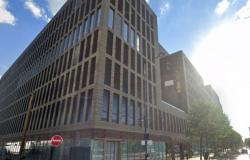The “Menhir” is gone. Jean-Marie Le Pen is deadthis Tuesday, January 7, at the age of 96, in an establishment where he had been admitted several weeks ago. “Jean-Marie Le Pen, surrounded by his family, was called back to God this Tuesday at 12 p.m.“, his family said in a statement sent to AFP.
During his political career, the co-founder of the National Front (FN) will have succeeded in making an initially modest movement a major party of the Vth Republic, against a backdrop of provocations, controversies and legal convictions. Shamed, outside his training, by the other political leaders with whom he clashed for several decades, Jean-Marie Le Pen ended up dividing even within his own political familyin search of demonization and tired of the excesses of his historical figure.
In nearly 65 years of career, he will have been several times MP, MEP, regional advisor and ran five times in the presidential election. Marking the history of the Vth Republic by its qualification in the second round of the 2002 presidential election, its excesses and the political capital that it left to the National Rally, the party which succeeded the National Front.
Several times convicted by the courtsJean-Marie Le Pen was notably sentenced twice in civil court, in 1991 and in 1999, for having declared on September 13, 1987, and reiterated several times, that the existence of gas chambers was “a detailed point of the history of the Second World War“. He was also convicted on criminal appeal in 2017 for protest of crime against humanityafter repeating these remarks in 2015. Conviction confirmed in 2018 in cassation.
Political beginnings
In 1956, the IVth The Republic is experiencing its last moments and Jean-Marie Le Pen is elected, at the age of 27, deputy for the Seine. Unknown to the French at that time, he took advantage of the popularity of his then mentor, Pierre Poujade, and of a proportional ballot to enter the Palais-Bourbon. He was nevertheless authorized to leave the benches of the National Assembly to serve in Algeria. Several decades later, he would be accused of having used torture during the Algerian War.
Subsequently Jean-Marie Le Pen, who fell out with Pierre Poujade, was re-elected as a deputy in 1958, despite the reestablishment of the single-member majority vote. He therefore participated in the first legislature of the Vth Republic, during which he vigorously opposed the independence of Algeria. He failed to get re-elected in 1962, and was defeated in 1968.
The birth of the National Front
At the same time, Jean-Marie Le Pen puts his life’s work into the work: the building of a large far-right party. In 1972, he participated in the founding of the National Front, notably with members of the nationalist New Order movement. The first results were modest, and the main observers of the time affirmed that the far right was forever disqualified by the atrocities committed during the Second World War from hoping to count in French political life. In 1974, Jean-Marie Le Pen received only 0.75% of the votes in the first round of the presidential election.
And yet, from 1983, the FN saw its scores increase. Jean-Marie Le Pen was elected municipal councilor in Paris, while the party’s number 2, Jean-Pierre Stirbois, obtained 16% of the votes in the partial municipal elections of Dreux. A “thunderclap” at the time. With more media coverage, the party achieved its first successes. Jean-Marie Le Pen entered the European Parliament in 1984 and nine other FN candidates were elected.
An FN group in the National Assembly
But it was during the legislative elections of 1986 that the National Front acquired a definitively significant weight on the French political scene, helped by a one-round proportional list vote desired by François Mitterrand. 35 frontist deputies are elected. For the first time, a French far-right party has its own parliamentary group in the Assembly. The rise of Jean-Marie Le Pen and his party has begun.
During this period, the leader of the FN complained about the special treatment reserved, according to him, for his party in the media. A speech which still has familiar accents today. In 1987, during a question session with the government, he criticized a form of “intellectual terrorism“, vilifying in particular the attitude of AFP journalists, and asking the then Minister of Culture and Communication, François Léotard, to remedy it.
In 1988, he received 14.4% in the presidential election, then 15% in 1995. However, the increasing weight of the National Front began to worry political representatives. In view of the legislative elections of 1988, Jacques Chirac decides on a new change of ballot, which penalizes the FN. The latter loses his group in the Assembly.
Jean-Marie Le Pen was then weakened by an internal movement: at the twilight of the millennium, the “Menhir” had to face an internal split in his party, led by Bruno Mégret. Half of the executives leave the ship, leaving the activists in complete disarray. This is the beginning of what seems to resemble an attrition of the movement and a crossing of the desert for its leader, who is witnessing a decline in the FN in the 1998 European elections.
The shock of 2002
And yet. In 2002, to almost everyone’s surprise, Jean-Marie Le Pen qualifies for the second round of the presidential election for the first time, at the expense of the socialist Lionel Jospin. The most notable success of his political career. “It was a surprise because the National Front was emerging from a very serious crisis. […] But as a result, perhaps I had been underestimated“, he confided in 2014 on LCP, while emphasizing “underperformance“by Jacques Chirac and his score”pitiful“.
In a particular security context, the anti-migrant policy of the FN, which denounces lax justice, calls for “zero tolerance” and advocates national preference has borne fruit. Jacques Chirac, the outgoing president, refuses to debate with his opponent and collects a quasi-Soviet score in the second round, but no matter: Jean-Marie Le Pen won his bet.
Five years later, the president of the FN failed to repeat this feat, placing in fourth position in the first round. He then decided to hand over to his daughter, Marine Le Pen, while retaining his elective mandates. He remains a regional councilor for Provence-Alpes-Côte d’Azur until 2015, and a European deputy until 2019.The memory I take away from this house after 35 years in office is a little bit of a feeling of uselessness.“, he says about the European Parliament.
A discreet heritage
What will remain of Jean-Marie Le Pen’s legacy? Without him, the National Rally would not be this party with 88 deputies in the Assembly, strong in having qualified its leader, Marine Le Pen, in the second round of the presidential election in the last two elections, and which does not hide its ambitions for 2027.
However, since 2011, when he became honorary president of the FN, the patriarch has become cumbersome. As early as 2012, he publicly expressed his opposition to part of his daughter’s presidential program, on pensions. Then opposes the strategy of “de-demonization” advocated by his successor, multiplying outrageous declarations. In 2015, he reaffirmed that the gas chambers are a “detail“of history, then defends Marshal Pétain. His convictions, his past slip-ups, including the famous pun”Durafour crematory” pronounced against a minister, stand out.
The tutelary figure has become tense, at a time when the National Front is beginning its transformation and seeking to normalize itself. Marine Le Pen calls on him to withdraw from political life. He was excluded from the party he helped found in August 2015, and engaged in internal legal battles to challenge this exclusion. His position as honorary president of the National Front was abolished in March 2018, during a congress in Lille, where, cruelly symbolic, the process of changing the name of the party was also recorded.
It is therefore from the outside that the Morbihannais witnesses the transformations of the structure that he launched and popularized, and the rise of young executives, like Jordan Bardella, head of the list for the 2019 Europeans, who currently occupies the party presidency. He does not completely renounce public life, welcoming the qualification of Marine Le Pen for the second round of the 2022 presidential election. But his appearances are becoming rarer. Without his hopes of seeing the National Rally coming to power having been fulfilled.






